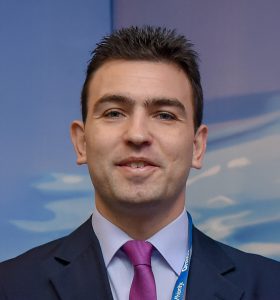Vasileios F. Zymperdikas is a Military Orthodontist in the Dental Department of
the 424 Military Hospital of Thessaloniki, a Research Fellow in the Department of
Orthodontics of the Aristotle University of Thessaloniki and a Doctoral Degree
Candidate in the Department of Midwifery of the University of Western Macedonia.
He received his Dental Degree from the School of Dentistry of the Aristotle
University of Thessaloniki in 2011 and his Masters Degree in Orthodontics from the
same School. He has worked at the Dental Department, of the 401 General Military
Hospital of Athens, the Oral and Maxillofacial Department of the 401 General
Military Hospital of Athens and the Department of Orthodontics of the 424 Military
Hospital of Thessaloniki.
Furthermore, from July 2017, he has sequentially served as Vice President,
President and Past President for the European Postgraduate Students Orthodontic
Society (EPSOS). Currently, he is the President of the Orthodontic Society of
Northern Greece, President of the Balkan Association of Othodontic Specialists
(BAOS) and he serves as a Greek Ambassador for Mediterranean Orthodontic
Integration Project (MOIP).
Additionally, he has participated in national and international congresses. He has
also co-authored several scientific articles and two orthodontic book chapters.
Moreover, he has received several awards including the “Roberto Justus Rising Star
Scholarship” from the Word Federation of Orthodontists (WFO) in 2025 and the
“Francesca Miotti Young Speakers Award” from the European Federation of
Orthodontic Specialists Association (EFOSA) in 2022. His research interests include
mainly early orthodontic treatment, temporary anchorage devices, bone-related
drug effects and evidence-based medicine/orthodontics.

Dr. Vasileios F. Zymperdikas
Bio
Abstract
The use of skeletal anchorage in the treatment of complex cases: an evidence-
based update
The success of orthodontic treatment relies on the successful combination of clinical
expertise, sufficient knowledge of current evidence and respect to the patients’
expectation. This is particularly true in the treatment of complex cases, where the
implementation of conventional appliances is often reported to present several side-
effects which lead to compromising treatment outcomes.
The implementation of temporary anchorage devices (TADs), such as mini-implants
or miniplates, is considered as a solution to overcome these drawbacks and expand
the boundaries of conventional treatment alternatives. In this respect, TADS are
increasingly being used for the treatment of a wide range of malocclusions, yet their
relative efficiency remains questionable in the literature.
The objective of the present lecture is to present and discuss current high-level
evidence regarding the influence of various elements of skeletal anchorage devices
on the treatment of several types of orthodontic malocclusion. Moreover, pertinent
clinical cases will be displayed in order to identify the beneficial role of incorporating
the latter research findings in everyday clinical practice.